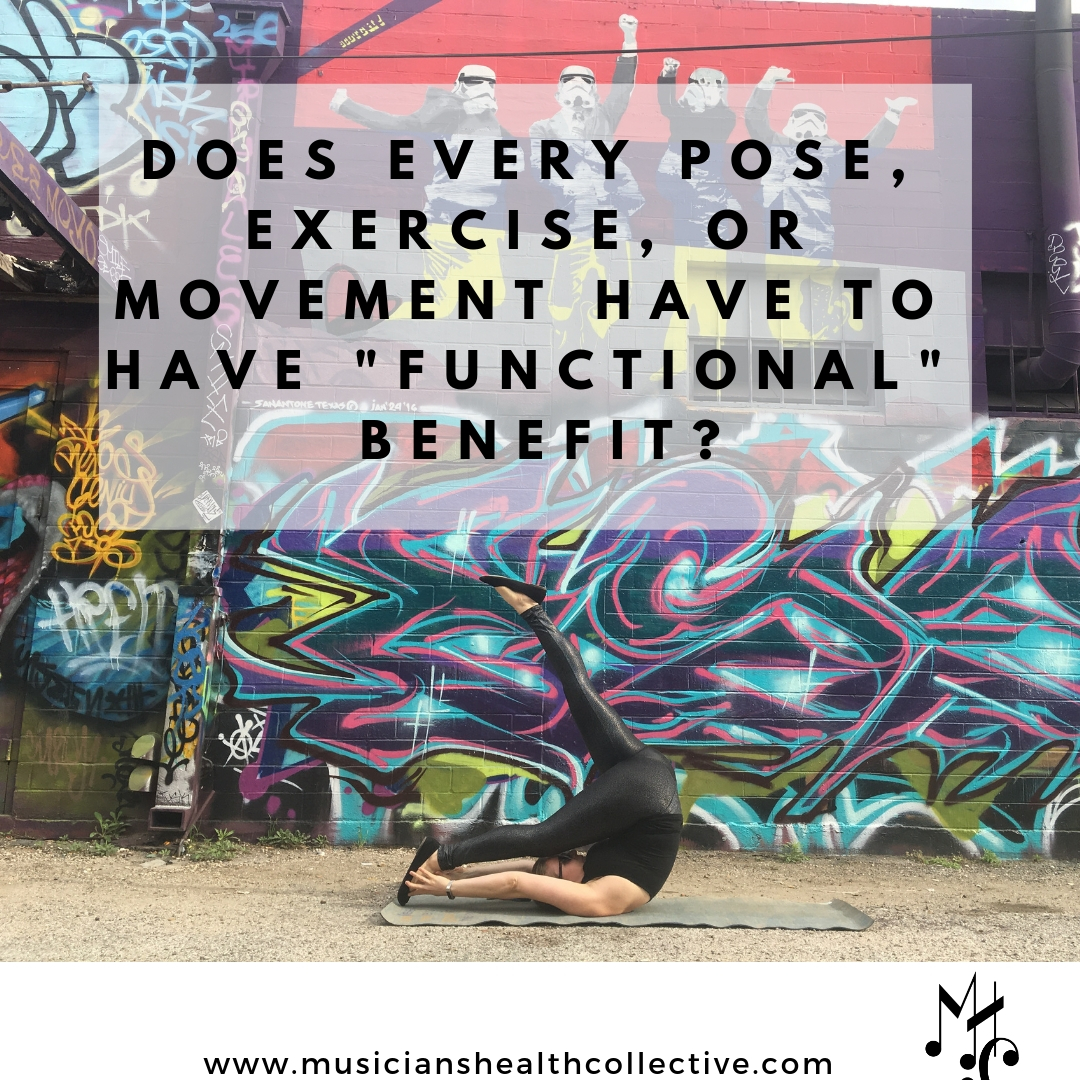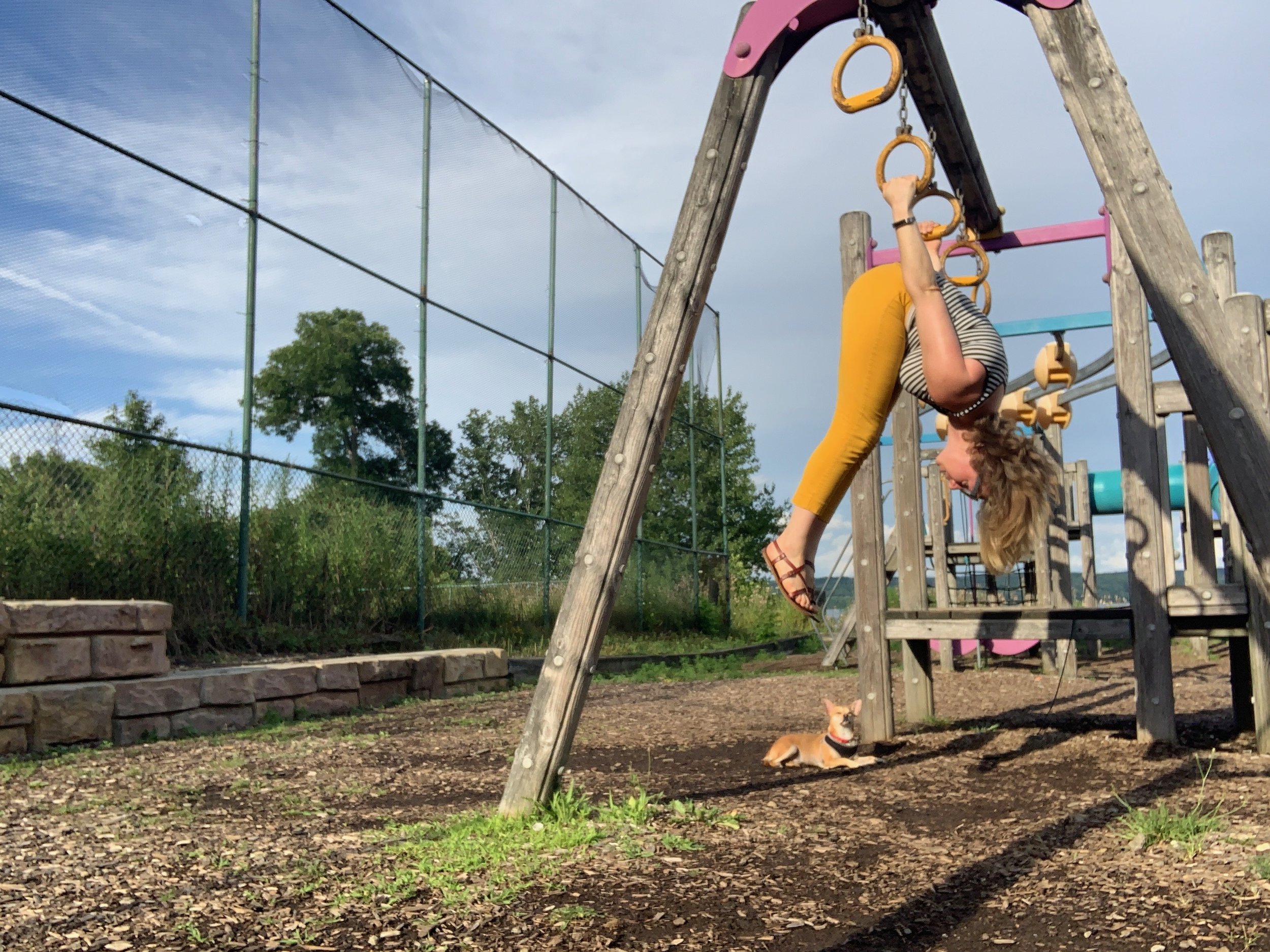Does Every Pose, Exercise, or Movement Have To Have Benefit?
I’m in a pose from the original Joseph Pilates’ mathwork from his book, Return to Life. This is not a pose that I do all that often, and I rarely if ever teach it because I don’t think it’s that beneficial in the scheme of things. But, I can do it, and it’s an interesting challenge. Should we only practice movements that have maximum transference to our daily life, and what is the value of moving in ways that may be novel and less transferable?
I generally avoid the comments sections of websites, whether it be Facebook, instagram, or another platform, but one day last week, I saw an interesting comment thread on instagram with a movement educator, Chandler Stevens, practicing different kinds of squats, sometimes called sissy squats. (Side note, yes that’s a terrible name for a squat). The commentor said that the movement didn’t have a clear purpose except to serve the ego, and it went down a gnarly nasty tunnel from there.
This led me to an interesting thought- why do we move? Whether it’s walking, running, dancing, or something else, why bother? For many people, it’s because of the health benefits, but sometimes it’s because of joy, an expression of creativity, or sometimes we want to challenge the limits and potential of our body. We spend so much time looking at functional movements in movement education these days- movements that translate to everyday life, and while there is value in the video in question here, does everything we do have to have maximum transference and benefit? Many of us are trying to maximize our results in looking a certain way or feeling a certain way, but what about other possibilities like:
1) What about the neurological benefits of movement? What are the benefits of exploring what’s possible for your own body? Does moving in a different way impact proprioception, kinesthesia, or other aspects of awareness? How do novel ways of moving impact creativity?
2) If a movement doesn’t initially look beneficial, does it mean that it’s not? If you can’t do a movement because of your own bodily restrictions and abilities, does it mean someone else can’t?
I love playing on monkey bars and rings, and this movement, sometimes called “skin the cat” or “cat walkover” feels great in my body. It’s not particularly functional to tasks of daily living but it feels good to me, so I practice it.
3) If a person has a wide range of motion, is it bad for them to explore and express that range of motion if they’re not injured?
4) If a person’s body is adapted for the range of motion and load that they are managed, who am I (or you) to police their movement? Why are they moving this way, and do they have to have a why?
5) What does functional actually mean? Functional for whom and for what?
6) In both yoga, pilates, strength training and other movement disciplines, there are movements that are more functional to daily living, and movements that are less functional. Is it ok to teach the full range of postures from a method in order to honor the method, even if not all the positions are deemed “functional?”
7) Does anyone really have the right the judge anyone’s movements or body via social media, specifically a 2x2 inch phone screen? Without knowing the person, the body, and the context, and without being a clinician, how can I determine if a movement is bad or irrelevant? And how I can I determine if someone’s form will hurt them?
As you can imagine, the answer to all of these questions is a cross between “it depends,” “maybe,” “yes,” and “no.” There are millions of people, practitioners, fitness coaches, and movement teachers on social media, and you can see everything between highly organized, meticulous workout regimes, to extreme displays of bodily strength and mobility. Instagram in particular has become a place for people to see other people move, whether it’s informational, performative, or something else. Yet, many of these movers are teachers, meaning that their choices are based on some understanding of their own bodies, strengths, weaknesses, and desires. If someone wants to put their foot behind their head and balance on their hands, I don’t have to like it, I don’t have to teach it, I don’t have to do it, and I don’t have to endorse it for the general public. But without knowing the person at hand, I don’t really have permission to say it’s an egotistical move, that they should do something else, or that they’re going to hurt themselves. I have no idea what’s really going on in their bodies, and I have no idea what their goals are as a mover.
5) What does functional actually mean? Functional for whom and for what?
6) In both yoga, pilates, strength training and other movement disciplines, there are movements that are more functional to daily living, and movements that are less functional. Is it ok to teach the full range of postures from a method in order to honor the method, even if not all the positions are deemed “functional?”
7) Does anyone really have the right the judge anyone’s movements or body via social media, specifically a 2x2 inch phone screen? Without knowing the person, the body, and the context, and without being a clinician, how can I determine if a movement is bad or irrelevant? And how I can I determine if someone’s form will hurt them?
As you can imagine, the answer to all of these questions is a cross between “it depends,” “maybe,” “yes,” and “no.” There are millions of people, practitioners, fitness coaches, and movement teachers on social media, and you can see everything between highly organized, meticulous workout regimes, to extreme displays of bodily strength and mobility. Instagram in particular has become a place for people to see other people move, whether it’s informational, performative, or something else. Yet, many of these movers are teachers, meaning that their choices are based on some understanding of their own bodies, strengths, weaknesses, and desires. If someone wants to put their foot behind their head and balance on their hands, I don’t have to like it, I don’t have to teach it, I don’t have to do it, and I don’t have to endorse it for the general public. But without knowing the person at hand, I don’t really have permission to say it’s an egotistical move, that they should do something else, or that they’re going to hurt themselves. I have no idea what’s really going on in their bodies, and I have no idea what their goals are as a mover.
“Junk Movement: A way of moving that provides short-term fitness benefits at the expense of long-term health.”
Humans have always been curious about the limits of our body, whether it’s in distance running, an ironman, extreme climates, summiting mountains, new gymnastic tricks, and more. Some people love this search for their own limitations, other people hate it. Biomechanist Katy Bowman talks about nutritious movement vs. junk movements, things we may love to do that may not be the most beneficial for us. My question is, if something gives you extreme joy that may be from the “junk movement” category, why not continue doing it?
What are the inherent benefits of doing something you enjoy or love doing, even if there’s a toll on your body? I professionally play an instrument, which falls into the junk food movement category- my body is constantly adapting (not always positively) to asymmetry and sitting, but I have deemed the rewards of music making as being worth the “biological tax.” Dancers, professional athletes, musicians and many others choose the activity over the toll it takes on their body because they love it and that’s worth something in and of itself.
Where the real responsibility lies, in my opinion, is when you teach movement to a group of people, and that’s a totally different conversation (and blog) in and of itself, one that should probably not happen in the comments section of an instagram post..




